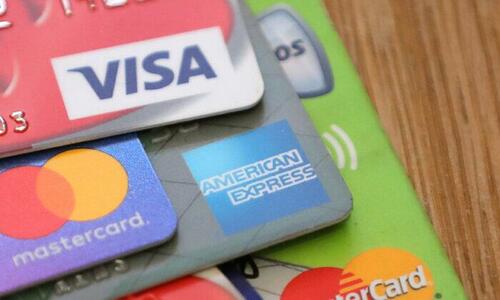
Authored by Naveen Athrappully via The Epoch Times (emphasis ours),
Credit card provider Discover Financial Services will soon allow its network to track purchases made using payment cards at gun stores—triggering criticism that such activity leads to targeting gun owners.

In September, the International Organization for Standardization (ISO) had launched a Merchant Category Code (MCC) for gun retailers. ISO is the organization responsible for classification of merchant categories used by payment cards. Discover told Reuters that it plans to implement the code beginning April. “We remain focused on continuing to protect and support lawful purchases on our network while protecting the privacy of cardholders,” the company said.
Discover’s decision has attracted strong criticism online. “This is a MASSIVE problem Congress needs to address, IMMEDIATELY!” Lauren Boebert (R-Colo.) said in a March 3 tweet.
“Discover Card will begin tracking firearm purchases starting next month. There are more than 50 million Discover cards in use right now. They are coming for your guns little by little,” Congressman Troy E. Nehls (R-Texas) said in a March 3 tweet.
“It’s called a Social Credit System. I have been warning ppl this is coming. This is just the tip of the iceberg,” said radio host Doll Arntzen.
Social Credit System is a national credit rating system used by Beijing that ranks and blacklists people in China based on criteria approved by the communist regime.
“American citizens should be able to exercise their Second Amendment rights without fear of being tracked or discrimination against. We’re solving this in West Virginia with the Second Amendment Financial Privacy Act. Congress needs to follow our lead,” said Riley Moore (R-W.Va.) in a tweet.
Intrusive Action
In a Feb. 27 post, the National Rifle Association’s (NRA) “lobbying” arm Institute for Legislative Action (ILA) pointed out that Discover’s statement to Reuters did not provide an explanation as to how the company will determine which purchases are suspicious enough to warrant reporting.
Discover also did not reveal whether customers will be provided with any information in case their purchases have triggered an alert.
“Use of the MCC can only inform a credit card company that a certain amount of money was spent at what is considered a firearm retailer. It cannot be used to track what was actually bought, much less determine why the purchase was made,” the post said.
“Thus, the program inherently poses a risk to consumers of needlessly intrusive and harassing consequences for completely lawful and innocent conduct.”
Tagging Gun Purchases, Legislation
A Discover company spokesperson told Reuters that other payment network firms have also decided to impose the new MCC code in April, without naming the firms. “We were following the industry for consistent implementation,” the spokesperson said.
Back in September, Mastercard, Visa, and American Express also announced that they will be assigning category codes for sales that take place at gun stores and on gun-related purchases from stores dealing in sporting goods.
Discover is a minor player in the U.S. credit and debit card industry, only accounting for 2 percent of the $9.56 trillion in purchases made through the payment methods last year. Visa had a 61 percent share, followed by Mastercard with 26 percent, and American Express with 11 percent.
Meanwhile, states are taking action to counter payment firms’ moves to track gun purchases. On Jan. 12, West Virginia introduced the Second Amendment Financial Privacy Act which bars financial institutions from disclosing financial records “in a manner that singles out or discriminates against any person based on activity protected by the Second Amendment to the United States Constitution.”
The bill warned that the new MCC code for gun purchases will pave the way for “unprecedented surveillance” of individuals who abide by Second Amendment activity as well as “unprecedented information sharing” between the
Authored by Naveen Athrappully via The Epoch Times (emphasis ours),
Credit card provider Discover Financial Services will soon allow its network to track purchases made using payment cards at gun stores—triggering criticism that such activity leads to targeting gun owners.

In September, the International Organization for Standardization (ISO) had launched a Merchant Category Code (MCC) for gun retailers. ISO is the organization responsible for classification of merchant categories used by payment cards. Discover told Reuters that it plans to implement the code beginning April. “We remain focused on continuing to protect and support lawful purchases on our network while protecting the privacy of cardholders,” the company said.
Discover’s decision has attracted strong criticism online. “This is a MASSIVE problem Congress needs to address, IMMEDIATELY!” Lauren Boebert (R-Colo.) said in a March 3 tweet.
“Discover Card will begin tracking firearm purchases starting next month. There are more than 50 million Discover cards in use right now. They are coming for your guns little by little,” Congressman Troy E. Nehls (R-Texas) said in a March 3 tweet.
“It’s called a Social Credit System. I have been warning ppl this is coming. This is just the tip of the iceberg,” said radio host Doll Arntzen.
Social Credit System is a national credit rating system used by Beijing that ranks and blacklists people in China based on criteria approved by the communist regime.
“American citizens should be able to exercise their Second Amendment rights without fear of being tracked or discrimination against. We’re solving this in West Virginia with the Second Amendment Financial Privacy Act. Congress needs to follow our lead,” said Riley Moore (R-W.Va.) in a tweet.
Intrusive Action
In a Feb. 27 post, the National Rifle Association’s (NRA) “lobbying” arm Institute for Legislative Action (ILA) pointed out that Discover’s statement to Reuters did not provide an explanation as to how the company will determine which purchases are suspicious enough to warrant reporting.
Discover also did not reveal whether customers will be provided with any information in case their purchases have triggered an alert.
“Use of the MCC can only inform a credit card company that a certain amount of money was spent at what is considered a firearm retailer. It cannot be used to track what was actually bought, much less determine why the purchase was made,” the post said.
“Thus, the program inherently poses a risk to consumers of needlessly intrusive and harassing consequences for completely lawful and innocent conduct.”
Tagging Gun Purchases, Legislation
A Discover company spokesperson told Reuters that other payment network firms have also decided to impose the new MCC code in April, without naming the firms. “We were following the industry for consistent implementation,” the spokesperson said.
Back in September, Mastercard, Visa, and American Express also announced that they will be assigning category codes for sales that take place at gun stores and on gun-related purchases from stores dealing in sporting goods.
Discover is a minor player in the U.S. credit and debit card industry, only accounting for 2 percent of the $9.56 trillion in purchases made through the payment methods last year. Visa had a 61 percent share, followed by Mastercard with 26 percent, and American Express with 11 percent.
Meanwhile, states are taking action to counter payment firms’ moves to track gun purchases. On Jan. 12, West Virginia introduced the Second Amendment Financial Privacy Act which bars financial institutions from disclosing financial records “in a manner that singles out or discriminates against any person based on activity protected by the Second Amendment to the United States Constitution.”
The bill warned that the new MCC code for gun purchases will pave the way for “unprecedented surveillance” of individuals who abide by Second Amendment activity as well as “unprecedented information sharing” between the
Loading…







